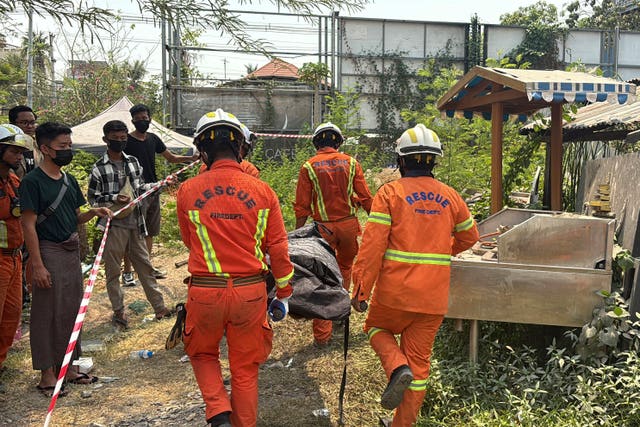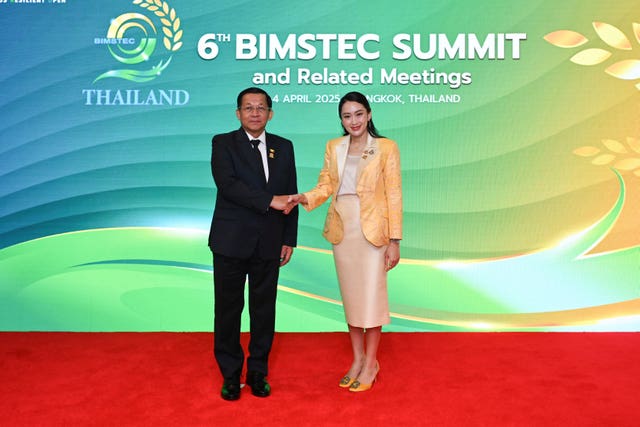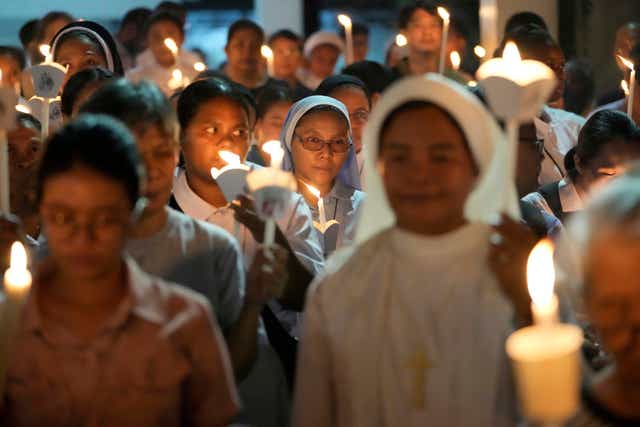UN urges relief efforts in Myanmar as earthquake death toll rises
The reported death toll from the March 28 disaster has reached 3,455, with 4,840 injured and 214 missing.

The death toll from last week’s massive earthquake in Myanmar has risen to 3,455, state media said, as UN agencies and foreign aid donors continued to ramp up emergency relief efforts.
The 7.7 magnitude quake hit a wide area of the country, causing significant damage to six regions and states including the capital Naypyitaw.
The earthquake left many areas without power, telephone or mobile connections and damaged roads and bridges, making the extent of the devastation hard to assess.

It worsened an already dire humanitarian crisis triggered by the country’s civil war that has internally displaced more than three million people and left nearly 20 million in need, according to the United Nations.
The military government’s leader, Senior General Min Aung Hlaing, has said the earthquake was the second most powerful in the country’s recorded history after a magnitude 8 quake east of Mandalay in May 1912.
Gen Min Aung Hlaing told Cabinet members on Saturday that the quake’s death toll has reached 3,455, with 4,840 injured and 214 missing, according to a report on state television MRTV.
He said 5,223 buildings, 1,824 schools, 2,752 Buddhist monasterial living quarters, 4,817 pagodas and temples, 167 hospitals and clinics, 169 bridges, 198 dams and 184 sections of the country’s main highway were damaged by the earthquake.
Myanmar’s military seized power in 2021 from the democratically elected government of Aung San Suu Kyi, sparking armed resistance that is believed by analysts to control more territory than the army.

Members of the UN Security Council “recognised the need to strengthen rescue, relief and recovery efforts and to scale up immediate and rapid humanitarian assistance in response to the requests to help the people of Myanmar, supported by the international community”, its president, Jerome Bonnafont, said in a statement on Friday.
In an apparent reference to the fighting in Myanmar and concerns that its military government would block or delay aid to areas under the control of resistance forces, the statement said the council’s members “affirmed the importance of a safe and conducive environment to ensure the timely and effective delivery of life-saving humanitarian assistance to all those in need, without disruption or discrimination”.
Major General Zaw Min Tun, spokesman for the military government, said on Saturday that prime ministers and officials from regional countries including India and Thailand had pledged to provide assistance for relief efforts and rehabilitation in quake-hit areas.
“Everyone helped Myanmar that suffered from the earthquake. Everyone sympathised. Everyone understood. Everyone was willing to help. It can be seen everyone working together practically,” he said.
He added that 18 countries were providing assistance to affected areas, and more than 60 aircraft had flown in to transport rescuers and relief supplies.

The UK allocated a further £10 million to the humanitarian response, its embassy in Yangon said in a statement on Saturday, taking its total to £25 million.
Although reports of diplomatic activity focus on earthquake relief, there is awareness that the crisis in Myanmar cannot end until the war stops, and the country’s neighbours have been leading efforts to find a path for peace, even though neither the military nor its foes have shown any serious effort to negotiate.
However, the military and several key armed resistance groups declared temporary ceasefires on Wednesday after the earthquake to facilitate the flow of humanitarian aid.
The UN’s Human Rights Office on Friday accused the military of continuing attacks, claiming there were more than 60 after the earthquake, including 16 since the ceasefire.
The opposition’s shadow National Unity Government, which leads resistance to army rule, on Saturday accused the military of carrying out 63 air strikes and artillery attacks since the earthquake, resulting in the deaths of 68 civilians, including one child and 15 women.





